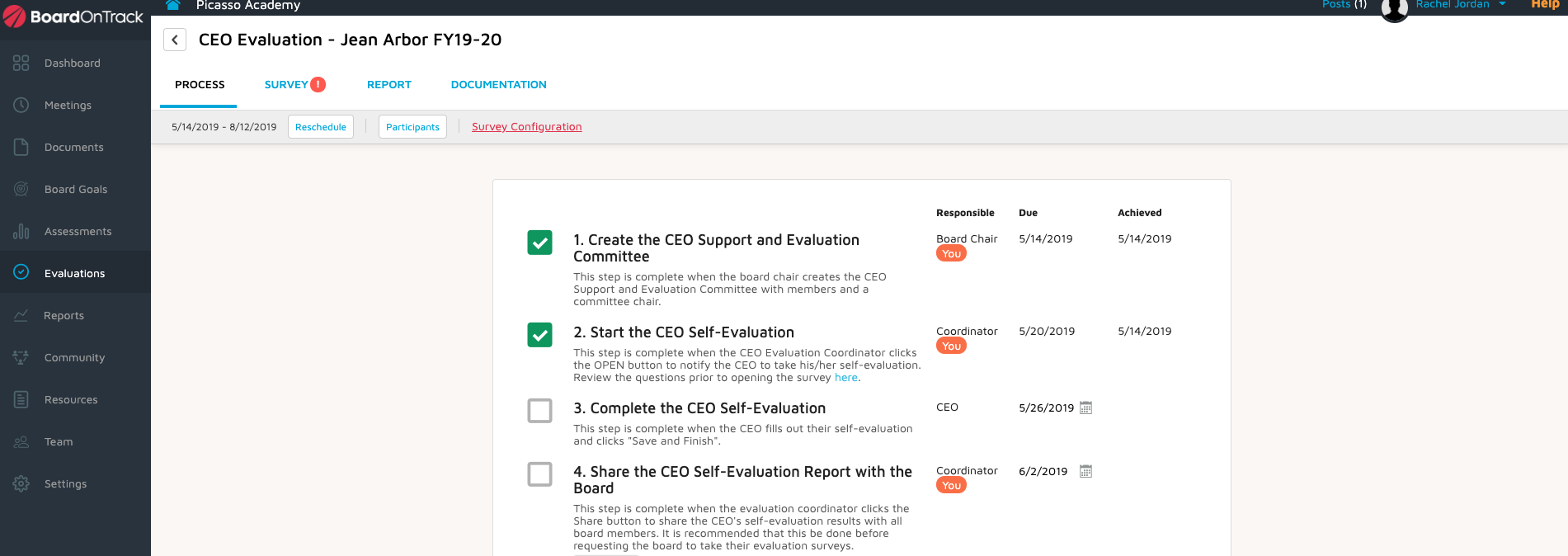
How Charter School Leaders Can Lead the Compensation Conversation
This is the second installment in our series built to pull back the curtain on charter school leader compensation. And help charter CEOs and board chairs get it right.
Take a look at part one here. Reach out to us to share your stories and questions. Or, if you’re a BoardOnTrack member, start a conversation in our members-only community.
Like so many things in charter school leadership, successfully negotiating charter school CEO compensation depends on a good process.
Effective charter school governance is certainly predicated on having good group process.
And nowhere is this more apparent than in the realm of asking your board for a raise.
Compensation can be a sticky subject in any space. But, especially in the charter space.
In general, people have all kinds of thoughts and opinions about executive compensation.
And, for a whole host of reasons, compensation of those in public service is even more fraught with conflicting opinions than in other sectors.
Having good process will help you uncover and address any misconceptions, gain philosophical alignment, and ensure you’ve got all the right pieces in place for smart data-driven decisions.
The BoardSavvy™ CEO knows the questions they want the board to address, does the legwork to bring benchmark data to the board, and builds ample time for good group process. Here’s how.
Here Are the Six Key Pieces Charter Leaders Need In Place Before Talking Compensation
1. Form a CEO Support & Evaluation Committee
Create an official committee within your board to take the lead on your role & compensation.
In a nutshell, the CEO Support & Evaluation Committee guides the process of revisiting the CEO’s job description, goals, mid-year check-in, and end-of-year evaluation. These are the key components of a solid year-round CEO support & evaluation process.
And, this is the committee that handles issues of CEO compensation.
2. Define Your Job
Make sure you have a board-approved job description. And that it accurately reflects the current realities of your role.
The role of a charter school leader is complex. You are the CEO of a multimillion-dollar public enterprise. And you’re probably growing significantly each year.
If you’re running a $15M organization with multiple campuses, but your job description was drafted along with your original charter application when you were a $2M organization serving a few hundred kids, it’s time to revisit the details. Your role has changed dramatically.
Dust off that original job description. Rewrite it. Work with your CEO Support & Evaluation Committee to finalize it. And get the board to approve it. Use our sample job description as your starting point.
There’s more to defining your job than just the job description. Here’s the game-changing secret.
Estimate how you plan to allocate your time. Put a percent next to each item in the position description. This will be an eye-opener for you and your board.
For instance, Caprice Young of Learn4Life — and a Charter Hall of Fame inductee — recommends that you plan to spend a good 30% of your time with your board. If you haven’t proactively put that in writing, you can easily end up with a job description that simply requires more hours than you’ve got in a day. With unrealistic expectations, you’re not likely to meet — or exceed — your goals. And positioning yourself well for the compensation conversation becomes that much harder.
Finally, don’t let that updated job description gather dust as your organization evolves.
At the beginning of each new school year, make sure you’re completely aligned with your board on both pieces — the job description and your time allocation. You might even make your approved job description a deliverable of your annual board retreat.
This will save everyone from a great deal of frustration and misconceptions later on. It will ensure that your year-round CEO support & evaluation process is built on a solid foundation. And that’ll be key in ensuring you can have a productive, well-informed conversation about your compensation.
3. Set Clear, Measurable Goals
What results are you on the hook to deliver? Create a clear set of goals for the year. Make them specific and measurable. And do this at the start of every school year. {This is another excellent element to include in your annual board retreat.}
Start with the core promises in your charter — and in your accountability plan, if you’ve got one. Articulate to the board where you plan to meet or exceed these goals.
Add stretch goals, too. But keep them within reason. This should not be an exercise in “shock and awe.” It should be high-level organizational goals, tied to a reasonable set of KPIs, in a format that you and the board can consistently review at each and every board meeting.
Work with your board committees to understand and agree to your goals. This might all happen in your CEO Support & Evaluation Committee. Then, bring your goals to the full board to vote and approve. The board vote solidifies that this is what you will be held accountable to deliver in the coming year.
Bonus points! The real BoardSavvy® CEOs also get the board to approve a timeline. They define exactly when you’ll report out on your progress toward each goal. And what reporting will happen at the committee level vs. the full board’s meetings.
4. Before you start talking compensation, gain full-board philosophical alignment.
In addition to aligning on base salary, you and your board need philosophical alignment about performance pay and other potential pieces of your overall compensation package.
Partner with your CEO Support & Evaluation Committee here as well. Look to them to frame the key philosophical alignment issues that need to be tackled.
Work with them to map out an effective process to dive into these issues at the committee level, and then to get full board buy-in.
Determine an appropriate base salary, and what it will be based on.
The CEO Support & Evaluation committee will consider whether base salary should be on par with the district — or above it. Whether it’ll be based on local salary scales, or national. They’ll decide whether bonus or performance pay will be offered. And, if so, what such a bonus will be tied to.
Think about what your trustees’ questions and concerns might be. Consider how you’ll structure the right conversations to depersonalize things.
Be aware of a chief misconception your board might bring to the table.
Some assume that charter school leaders can be directly compared to more traditional public school administrators. And, this leads to the assumption that the compensation conversation should work the same way. If your board is bringing that to the table, you’ll need to dispel that myth right out of the gate in order to gain philosophical alignment..
The charter school CEO is not a public school administrator.
Be clear. You are the CEO of a multimillion-dollar public enterprise. Your role is not the same as that of a traditional public school principal or administrator. And the conversation around your compensation is not the same.
As charter school CEO, you’re not only responsible for the teaching and learning that happens within your building, like your traditional public school peers.
You’re also responsible for finding and securing a permanent home for the school, managing all the financial systems, processes and procedures, handling all HR responsibilities, fundraising, and building and sustaining an exceptional governing board.
In the traditional public school setting, all of these items are handled by teams of people in a central office.
This is a very important distinction when level-setting about this position and therefore how this all fits into the question of appropriate charter school leader compensation.
Other questions to be sure you can answer about the increase you would like to ultimately get the board to agree to:
- Is it aligned with the market? (Do your research and understand how it fits within the market, be ready to justify any discrepancies.)
- Is there budget for this? (Build the budget assuming you will get the raise)
- Is it equitable within the organization? (Provide data around increases, salary ranges within the organization and justify why the CEO should be at the level you suggest.)
5. Include Potential CEO Compensation as Part of Your Budgeting Process
Make sure that there is thoughtful dialogue and intentionally build in to the budget the potential increase. As mentioned above, you should build your annual budget assuming that you will get the raise you intend to negotiate with the board.
Don’t be shy about discussing non-cash aspects of CEO compensation.
Some of our members have negotiated non-cash compensation aspects like tuition reimbursement, paid or unpaid sabbaticals, or extra vacation time.
6. Complete an Annual CEO Evaluation
A robust annual evaluation includes a self-evaluation of how you did towards the results you promised to deliver, and an opportunity for your full board to weigh in.
We recommend a process that’s clear, consistent, and year-round. The CEO’s evaluation shouldn’t be done in a last-minute scramble at the end of the school year.
Not sure where to start? You don’t need to make it up as you go. We’ve helped hundreds of charter school leaders effectively utilize our proven CEO evaluation process.
The BoardOnTrack platform guides CEOs and their boards through the process, step by step. And allows your board to track evaluation results year over year, allowing the compensation conversation to also recognize long-term upward trends in performance.
Are you ready to ask your board for a raise?
With the leg work done on philosophical alignment, your board squarely in the driver’s seat feeling like they have been part of this process, board-approved goals that you knock out of the park, a budget that is built to cover the anticipated salary request, your request should be a slam dunk.

Marci Cornell-Feist
With more than two decades in the field, Marci Cornell-Feist is a national expert on charter school governance whose work has helped more than 500 charter schools nationwide. Marci created BoardOnTrack to implement the most effective strategies and practices of her many clients, and as a means of spreading this information to a wider audience of charter schools. She's also a co-founder of The Achievement Network, which helps schools use data-driven strategies to raise student achievement, and previously founded and led the charter school consultancy, Meetinghouse Solutions.

